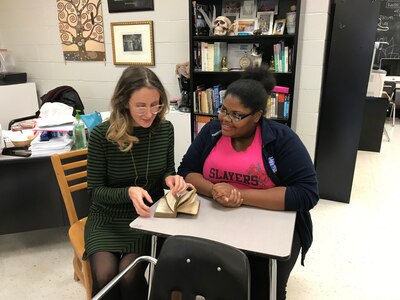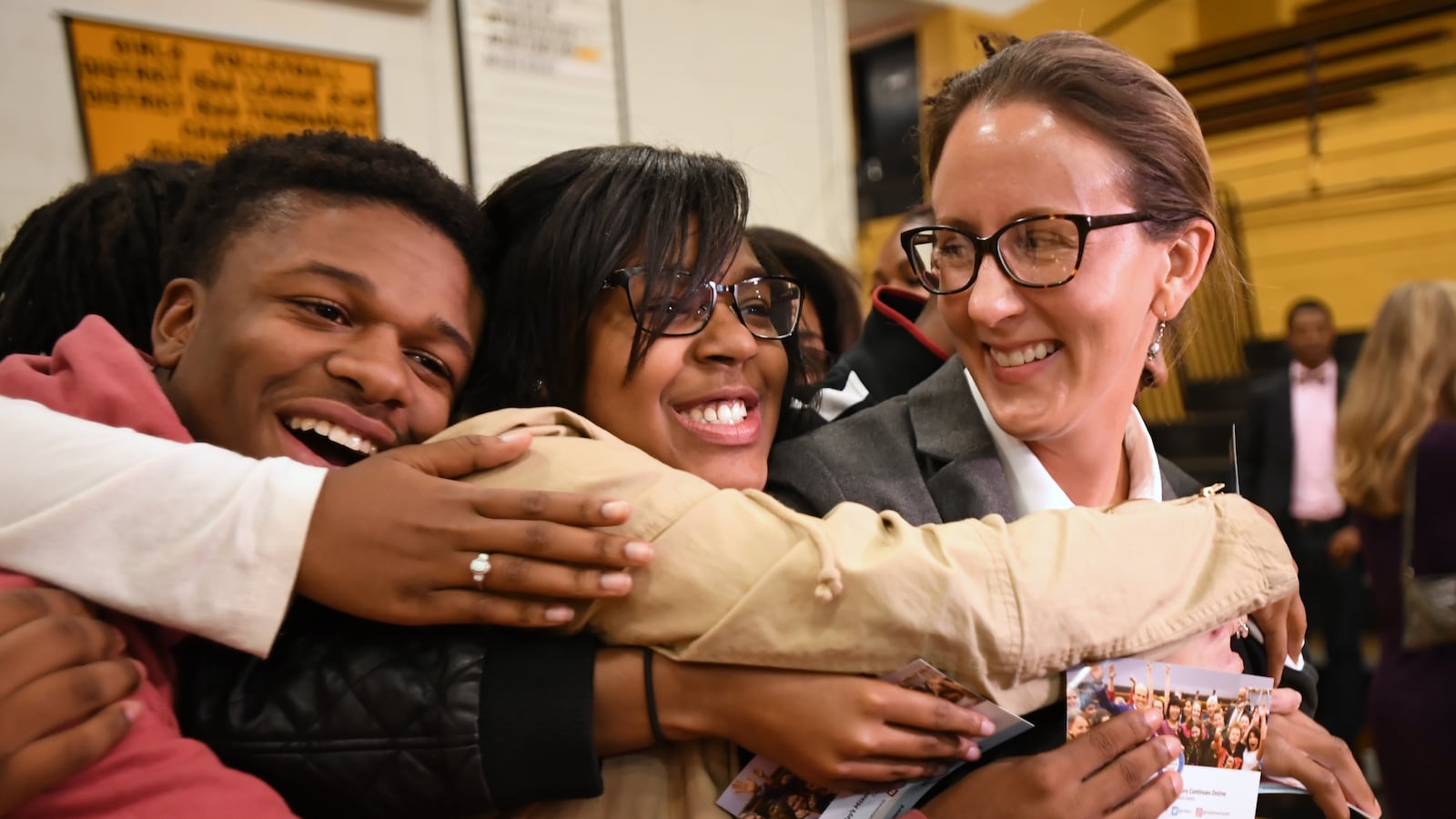How do teachers captivate their students? Here, in a feature we call How I Teach, we ask great educators how they approach their jobs. You can see other pieces in this series here.
When Katherine Watkins found out she would receive a prestigious national teaching award, her students at Millington Central High wrapped her into a huge bear hug.
“We relate to her because she relates to us,” one of her students said when asked why they enjoyed her class. Watkins was honored as a Milken Educator Award last November in front of her students, colleagues and Tennessee’s top education official.
Watkins was one of 45 educators — and one of two Tennessee teachers — honored nationally in 2017 by the Milken Family Foundation.
We asked Watkins about how she strives for relatability in her classrooms, where she teaches literature, English and coordinates the school’s yearbooks. Millington Central High is racially diverse and made up of about thousand students, one-third of which are described as economically disadvantaged.
Read in her own words how she uses pop culture to build classroom rapport and how she learned not to get flustered when her students got off track. (This Q&A has been edited and condensed.)
What does your classroom look like?
My classroom is full of books, images, and objects I’ve collected from my travels. These include a handmade Venetian mask I brought back from Italy, pictures I took while standing in front of the Blue Mosque in Istanbul, and a twelve-volume, leather-bound edition of the complete works of William Shakespeare that was published in London in 1786
Some people might say I’ve lost my mind to keep such precious relics within reach of teenagers, but I interpret the “value” of these treasures somewhat differently. I want desperately for my students to know and care about the world that exists beyond their immediate reality, and sometimes the best way to achieve that is through tactile experience. I’m trying to cultivate independent thinkers who have the confidence to test limits, ask tough questions, and arrive at their own conclusions. That can’t happen without direct confrontation with the unfamiliar, and until I can afford to actually take them to the places we read about in the literature we study, my souvenirs will have to suffice.
Fill in the blank. I couldn’t teach without my __________. Why?
I could not teach without my close-knit group of teacher friends. This is only my third year at my current school, but everyone was so warm and welcoming when I arrived that it really felt like coming home. We even have a group chat we use every day to share funny memes, vent about our frustrations, offer words of encouragement, and talk through ideas. Feeling like you can be yourself around friends in a judgment-free zone makes all the difference when it comes to a high-stress job like teaching. Without that kind of solidarity, I know I wouldn’t be nearly as resilient or effective in the classroom.
How do you get your class’s attention if students are talking or off task?
I used to get visibly flustered if students were talking or off task during the lesson. It took me a couple years in the classroom to realize that getting upset is the least effective way to deal with this problem. Many students misbehave because they crave attention, so getting upset is the same as relinquishing control. Nowadays, I vary my approach depending on the severity and intent of the disruption, but regardless of the situation, I never lose my cool.
I have the most success defusing behavioral disruptions through the use of nonverbal cues, which can be as simple as changing my position in the room. For example, if a cluster of students is off task while I’m addressing the whole group, I continue lecturing and simply move to where the problem is occurring and the behavior stops. I’ve also become a sort of Jedi master at the don’t-you-even-think-about-it stare of disapproval. The right look delivered at the right moment can work wonders for classroom management.

How do you get to know your students and build relationships with them? What questions do you ask or what actions do you take?
Before my first day at Millington Central High, I had little idea what to expect of my new school and its students. I had driven through Millington a time or two on my way to other destinations, but that was the extent of my familiarity with this community. During my initial interview, I was briefed on school demographics: Millington is ethnically diverse with a high percentage of economic disadvantage, a large SPED population, and nearly a quarter of students coming from single-parent households. It would be a lie to say I never questioned whether the school would be the right fit for me. I worried about my ability to make a connection. Would my students accept me? Would I be able to make a difference in their lives?
I always start each year by giving my kids a questionnaire that asks about their interests, hobbies, attitudes, and past experiences. I use this information to get to know students and begin establishing a rapport. Left to my own devices, for example, I would never be motivated to keep up with pop culture trends, but if a large number of my students are listening to a particular artist or watching a specific TV show (Stranger Things anybody?), I make a point of consuming the same media so I can connect with them over more than just academic content. This extra effort on my part—cultural research, if you will—has worked wonders with the kids at Millington. The look of shock on their faces when they realize I can quote lines from Hamlet as readily as the lyrics to any 2Pac song is priceless.
Tell us about a memorable time — good or bad — when contact with a student’s family changed your perspective or approach.
Knowing what’s going on in a student’s home life is a crucial part of being a good teacher, and I always try to consider the bigger picture when difficult situations arise. I have had students come forward with stories of abuse, students who have experienced the death of a parent, and students who are basically raising their younger siblings because Mom works three jobs and Dad isn’t around. A student who arrives to school late and sleeps through first period could just be lazy, but it would be callous and irresponsible to punish the child without first having a conversation to find out what’s causing the behavior. We can’t forget that kids are human beings too, some of whom are carrying the weight of the world on their shoulders. Teaching has made me realize that you can never really know what someone else is going through until you make the effort to understand. This is why it’s so important to reserve judgment and approach students with patience and compassion.


